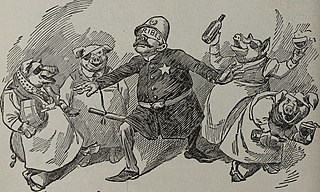
Police corruption is a form of police misconduct in which law enforcement officers end up breaking their political contract and abusing their power for personal gain. This type of corruption may involve one or a group of officers. Internal police corruption is a challenge to public trust, cohesion of departmental policies, human rights and legal violations involving serious consequences. Police corruption can take many forms, such as bribery.

The New South Wales Police Force is a law enforcement agency of the state of New South Wales, Australia, established in 1862. With more than 18,000 police, it is the largest police force in Australia, policing an area of 801,600 square kilometres with a population of more than 8.2 million people.

Law enforcement in Australia is one of the three major components of the country's justice system, along with courts and corrections. Law enforcement officers are employed by all three levels of government – federal, state/territory, and local.

The Independent Commission Against Corruption (ICAC) is an agency of the Government of New South Wales responsible for eliminating and investigating corrupt activities and enhancing the integrity of the state's public administration. The commission was established in 1989, pursuant to the Independent Commission Against Corruption Act, 1988 (NSW), modeled after the ICAC in Hong Kong.
Anthony Raymond Lauer, was an Australian police officer who served as the Commissioner of the New South Wales Police from 1991 until 1996. In February 1996, Lauer's term ended in controversy with his resignation soon after the start of the Wood Royal Commission into police corruption.
Arthur Stanley "Neddy" Smith was an Australian criminal who was convicted of drug trafficking, theft, rape, armed robbery, and murder.
Ray "Gunner" Kelly, MBE, was an Australian police officer who was a detective inspector with NSW Police, he became famous during his career owing to his high-profile cases and results, but who was later alleged to have been deeply involved in corruption and organised crime.

Ian David Karslake Watkins is a Welsh singer-songwriter, musician, and convicted child sex offender. He was the lead vocalist, and lyricist of the rock band Lostprophets. In 2013, he was sentenced to 29 years of imprisonment for multiple sexual offences, including the sexual assault of young children and babies, a sentence later augmented by ten months for having a mobile phone in prison. His bandmates disbanded Lostprophets shortly after his imprisonment and formed the band No Devotion, with American singer Geoff Rickly.
Ian Michael Macdonald is a former Australian politician and currently undergoing court proceedings and was a member of the New South Wales Legislative Council from 1988 to 2010 representing the Labor Party. Between 2003 and 2010, Macdonald held a range of ministerial responsibilities in the Carr, Iemma, Rees, and Keneally ministries. Macdonald, who joined the Labor Party in 1972, had his membership of the party terminated in 2013 for bringing the party into disrepute.
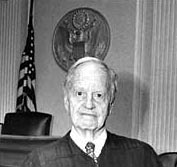
The Commission to Investigate Alleged Police Corruption was a five-member panel initially formed in April 1970 by Mayor John V. Lindsay to investigate corruption within the New York City Police Department. The creation of the commission was largely a result of the publicity generated by the public revelations of police corruption made by Patrolman Frank Serpico and Sergeant David Durk. The commission concluded that the NYPD had systematic corruption problems, and made a number of recommendations.
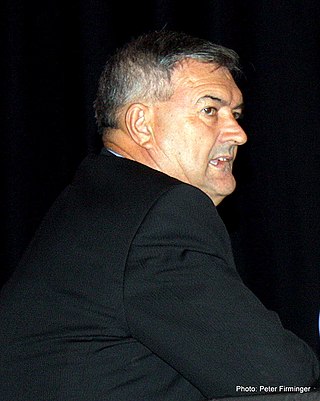
Anthony Bernard Kelly is an Australian former politician, who was a member of the New South Wales Legislative Council representing the Australian Labor Party from 1997 until 2011.
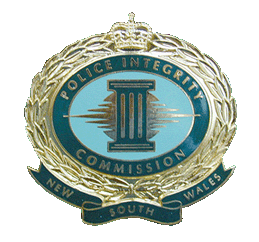
The Police Integrity Commission, was a statutory corporation of the New South Wales Government, responsible for the prevention, detection, and investigation of alleged serious misconduct in the Police Force in the state of New South Wales, Australia. The mission of the commission was to be an effective agent in the reduction of serious police misconduct. On 1 July 2017, the Police Integrity Commission was abolished and replaced by the Law Enforcement Conduct Commission.
Franca Arena is an Australian politician and activist. She was a Member of the New South Wales Legislative Council from 1981, first for the Labor Party then as an Independent from 1997 until she left the Council in 1999. Long recognised as a colourful and influential figure in New South Wales politics, Arena shot to national prominence in 1996 when, under Parliamentary privilege, she named retired judge David Yeldham and former New South Wales MP Frank Arkell as potential paedophiles.
The Paedophile Unit is a branch of the Metropolitan Police Service's Child Abuse Investigation Command, based at Scotland Yard in London, England. It operates against the manufacture and distribution of child pornography, online child grooming, and "predatory paedophiles online", and organised crime associated with these.
Underbelly: A Tale of Two Cities, the second series of the Nine Network crime drama series Underbelly, originally aired from 9 February 2009 to 4 May 2009. It is a thirteen-part series loosely based on real events that stemmed from the marijuana trade centred on the New South Wales town of Griffith. The timeline of the series is the years between 1976 and 1987. Underbelly: A Tale of Two Cities primarily depicts the Mr. Asia drug syndicate and its influence on crime in Australia. Among the characters presented are real-life criminals Robert Trimbole, Terry Clark, George Freeman, Christopher Dale Flannery, Alphonse Gangitano and the Kane Brothers. The mini-series is a prequel to the 2008 production Underbelly, which was about the Melbourne gangland killings and forms part of the Underbelly series.
Underbelly: The Golden Mile, the third series of Nine Network's crime drama series Underbelly, originally aired from 11 April to 27 June 2010. It is a thirteen-part series loosely based on real events that stemmed from the mile-long nightclub/red light district in the Sydney suburb of Kings Cross, also known as the "Golden Mile", between 1988 and 1999. It primarily depicts the organized crimes in Kings Cross and the police corruption leading up to the 1995 Wood Royal Commission. It is a prequel to Underbelly, which was about the Melbourne gangland killings, and a sequel to Underbelly: A Tale of Two Cities. Among the characters presented are John Ibrahim, Kim Hollingsworth, George Freeman, Lenny McPherson and MP John Hatton. Some of the characters, particularly those of the NSW Police, reprise their roles from A Tale of Two Cities.
The first signs of the modern distinction between criminal and civil proceedings were during the Norman conquest of England in 1066. The earliest criminal trials had very little, if any, settled law to apply. However, the civil delictual law was highly developed and consistent in its operation.

Corruption can take many forms, and can distort how public policy is made or implemented. This article discusses the responsibilities of the various agencies involved in combating corruption in Australia. While Australia is a wealthy democracy, over the decade since 2012, Australia's ranking in the Corruption Perceptions Index from Transparency International has slipped from 7th place in 2012 to 13th in 2022, where the country ranked first is perceived to have the most honest public sector. Additionally, there is a public perception that corruption in Australia is increasing. All states have broad-based anti-corruption agencies, and a national anti-corruption commission has been operational since July 2023.
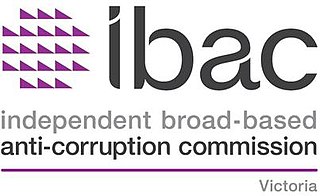
The Independent Broad-based Anti-corruption Commission (IBAC) is Victoria's anti-corruption agency with jurisdiction over the public sector. It does this by:










